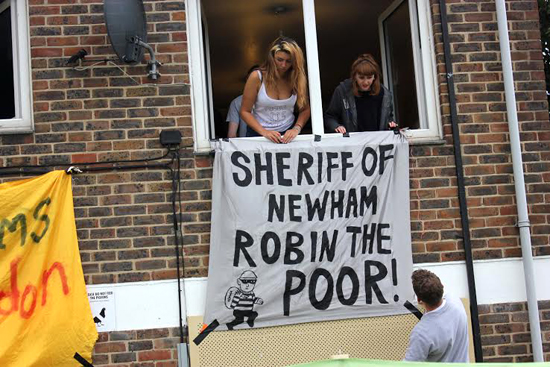
The screw is tightening on homeless people; the Salvation Army is reporting beggar claimants to the Department for Work and Pensions (DWP) and councils are using police and the courts to remove them from city centres. The Salvation Army is one of the few charities that participates in the government’s workfare scheme, and has been subject to praise by the DWP for ‘holding the line’ as other charities have distanced themselves from it.
The latest figures published by The Department for Communities and Local Government (DCLG) show that homelessness has risen since last year. 58,440 households were in temporary accommodation on 31 March 2014, 6% more than at the same date in 2013. The most recent DCLG statistics for rough sleeping showed a5% riseon last year, with 2,414 people reported by local councils across the country as sleeping rough on any one night in 2013, up from 2,309 in 2012 and from 1,768 in 2010. However, the number of people sleeping rough is impossible to collate accurately, and these figures will be a conservative estimate at best. The Shaw Trust reports that ‘In the most extreme cases, the Work Capability Assessment had led to homelessness and the use of food banks, with one customer reporting that after their assessment ‘they ended up homeless as it took three months to get income again”.
In London, where homelessness is the highest nationally, authorities launched ‘Operation Encompass’ in which police officers and border officials targeted places popular with rough sleepers. On one night in Westminster, they ‘processed’ 37 people and forced many more to leave. A police spokesperson, Alison Newcomb, said ‘begging will not be tolerated in the City of Westminster or any other London borough. Wherever possible people begging will be arrested and ASBOs sought where appropriate.’
Earlier this year the mayor of the London borough of Newham, Councillor Robin Wales, wrote an article in the Newham Recorder, attacking rough sleepers. Wales is notorious for his attempt to socially cleanse the area through the closure of the mother and baby unit of the Focus E15 hostel, the planned demolition of the Carpenter estate and the use of the police against homeless people. In his article he concluded ‘It is simply not acceptable, either for the people who find themselves in this situation, or for our wider community, to have people living on the streets of Newham, in our doorways or in unsafe, disused buildings.’ Yet Newham has an option of re-housing them – either on the Carpenter estate, or in the Olympic village. But Wales is more concerned at ensuring the sale of the Carpenter site, while houses in the Olympics village are now being resold or rented at unaffordable prices.
It is not just in London that homeless people are under attack. Newcastle City Council has recently announced that it plans to use the new Anti-Social Policing and Crime Act 2014 which comes in to effect in October, to remove ‘the top 10 most aggressive and persistent beggars’ from the city centre. The police will have the power under the new act to force those on the street into hostels. This is the proposed ‘solution’ for the whole country but research carried out by homeless charity Links found that 32% of people in homelessness projects were ready to move on – but couldn’t because of a shortage of available accommodation. In its Homelessness Strategy 2014-2019, the Council boasts that ‘despite the 24% reduction in funding there will only be a net loss of three bed spaces in supported accommodation in 2014-15.’ However, it is ludicrous to suggest that an already-stretched service will be able to run effectively with a 24% cut in its funding. As ever, the Council claims such cuts are unavoidable due to budgetary constraints, but this does not stop it spending money on a new façade for the city centre, a city for business, a city in which homeless people are not welcome.
Cal Shaw




